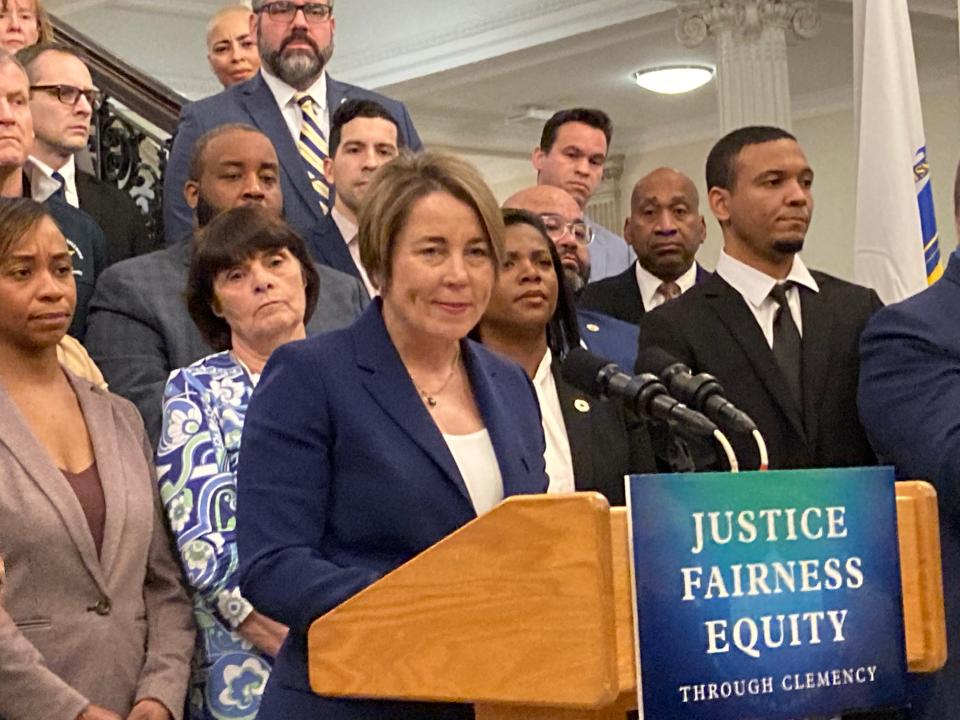Governor's Council approves Healey's sweeping pardon for past pot convictions
BOSTON ― Almost a month after Gov. Maura T. Healey proposed a blanket pardon for all misdemeanor marijuana possession convictions in Massachusetts, the Governor’s Council voted unanimously Wednesday to approve the plan.
The pardons are effective as of March 13 and date as far back as records are kept. There was no determination as to how the state would handle juvenile convictions, which are sealed once a teenager reaches age 18.
As they debated the matter, the councilors said the process should be as automatic as possible.
With the council's affirmative vote, residents can request and receive certificates of pardon after filling out an online form. The pardons would be noted on criminal records regardless of whether a resident requests the certificate, Healey said when she announced the proposal March 13.
It's not clear how many residents would receive pardons.
When Healey announced the pardon March 13, she described the action as applying to "hundreds of thousands" of people and said the approximate figure was "extrapolated" from data.

At an informational hearing prior to the council vote, Councilor Terrence Kennedy of Lynnfield asked Suffolk County District Attorney Kevin Hayden about the actual number of pardon recipients covered under the blanket action, noting that he heard the number "between 69,000 and 100,000" tossed around, and that Trial Court Chief Justice Heidi Brieger referred in a letter this week to "approximately 22,000 adult cases" contained in "electronic records.
"Don't you think we should be making more of an effort to find those other people and who they are? Most people that have a marijuana conviction don't know what's going on in this room today and never will," Kennedy said.
"They're not going to get on a portal and fill out a form to get a pardon document. They're not going to be writing on a job application that they've been pardoned. Because they're never going to know it unless we reach out somehow. Don't you think we should be doing more?"
"We should be doing as much as possible, I think," Hayden replied. "And I don't mean to be glib, but thankfully that's a problem I don't have to worry about. That's for the governor and probation office to worry about...We expressed this concern at the time that the issue was raised. It should be as automatic as possible."
Even as they commended the governor’s action, some council members expressed hope the state would go further, such as extending the pardon to expungement, the wiping clean of any references to convictions on possession charges. Councilors noted that while the pardons would be noted, those convicted on possession charges would still have criminal records.
Another suggestion was that the state extend the blanket pardon to include selected convictions for possession with intent to distribute, especially if the quantity of marijuana was considered to be small.
Council member Terrence Kennedy of Lynnfield noted that residents can go to a dispensary and purchase marijuana in the same or higher quantity than what would have prompted a conviction for intent to distribute.
“It’s not a crime anymore,” Kennedy said.
Newton Police Chief John Carmichael, head of the Massachusetts Major Cities Chiefs of Police, differed.
“It’s still a charge we can bring,” Carmichael said, adding that possession is not.
Massachusetts decriminalized marijuana possession in 2008 and legalized it in 2016 through ballot initiatives, asking residents to decide the issue. Since then, the state has been home to a billion-dollar recreational and medicinal-use marijuana industry.
Rep. Carlos Gonzalez, D-Springfield, who is co-chair of the Public Safety Committee, said the blanket pardon would unburden those in his district who have been convicted on possession charges prior to legalization.
“This will give them a chance to rebuild their lives,” Gonzalez said. “This will create opportunities for them to contribute to their community and advance equity and justice. This indicates that Massachusetts believes in second chances."
With reports from State House News Service.
This article originally appeared on Telegram & Gazette: Mass. Governor's Council OKs pardon on past marijuana convictions

